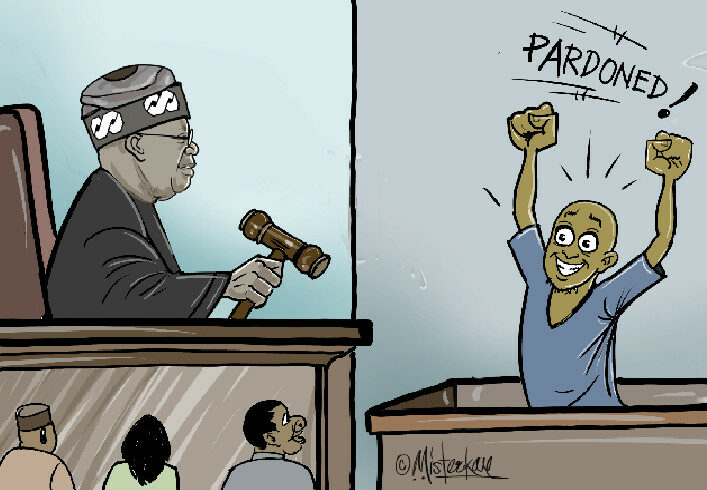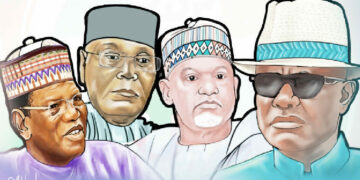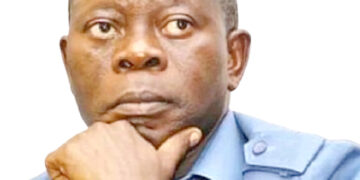There is an enduring tension woven into the fabric of every republic: mercy and justice are related, but not identical. The state must punish the guilty to uphold order and protect the innocent; yet a state that never forgives risks hardening into an instrument of perpetual punishment rather than a guardian of compassion and balance.
In the weeks since President Bola Ahmed Tinubu announced a sweeping round of clemencies viz posthumous pardons for historical figures and mercy for scores of convicted Nigerians, Nigeria has been reminded, again, that the exercise of mercy is as political as it is moral. The debate that followed has been instructive: it exposed the fragile balance between compassion and accountability, and the dangers when the balance tilts in a way that leaves victims, rule-of-law advocates and ordinary citizens bewildered or outraged.
Presidential clemency is nothing new in democracies. It is a power embedded into constitutional systems precisely because justice systems and legal judgments however painstakingly reached are not flawless. Pardons can right miscarriages of justice, offer second chances and fresh starts for rehabilitated offenders, and correct the errors of an earlier, unjust regime. These are deeply noble ends. But the nobility of mercy depends entirely on how it is used.
A pardon that restores dignity, acknowledges past wrongs, or relieves punishment where rehabilitation has demonstrably occurred can reinforce faith in the humane face of governance. A pardon that glosses over injustice, enables impunity, or appears to reward wrongdoing for reasons opaque to the public, corrodes public trust instead.
The Thin Line Between Mercy and Justice
The President’s recent exercise of clemency combined both redemptive and controversial forms of mercy. On one hand, there were welcome gestures—posthumous pardons for historically contentious cases and symbolic corrections of injustices from darker chapters of Nigeria’s past. Some of these, especially those involving figures believed to have been wrongfully executed under military rule, sparked reflection on truth, memory, healing and national reconciliation.
However, public sentiment shifted sharply when the list expanded to include over a hundred living convicts, some serving time for serious offences such as drug trafficking, corruption, and violent crimes. While families of those pardoned celebrated the decision as an act of compassion toward the elderly or reformed, rights groups and anti-corruption advocates voiced strong concern. They warned that pardoning individuals convicted of grave crimes sends a message that accountability is negotiable and that political considerations may outweigh public interest.
Amnesty International Nigeria and other observers cautioned that such pardons could undermine justice, deny victims closure, and weaken trust in already fragile institutions. The inclusion of controversial names tied to corruption or drug offences particularly angered citizens who viewed it as tone-deaf to ongoing national struggles against graft and substance abuse. Critics questioned whether the move reflected a principled review or a political act disguised as forgiveness.
The case of Ken Saro-Wiwa and the Ogoni Nine highlights these complexities. For many, their 1990s executions symbolised the brutality of military repression. Posthumous pardons may offer moral recognition, yet without clear exoneration, they risk implying guilt where none was proven. To exonerate restores innocence; to pardon forgives guilt. When that distinction is blurred, clemency can reopen old wounds and re-traumatise victims instead of healing them.
Mercy Without Transparency Breeds Distrust
The confusion did not end with the content of the list. There were conflicting reports about the number of beneficiaries. Some cited 175, others 147 or 82 as the list was reportedly revised and clarified. In a matter as serious as clemency, such administrative ambiguity feeds suspicion.
Good governance demands clarity. A modern, democratic pardon process should be transparent, with clear explanations—legal, moral, and administrative—of why each individual is considered for mercy. Where victims exist, their perspectives must be acknowledged. Where offences carry a public dimension, such as corruption or human-rights violations, the state must demonstrate that mercy will not erase truth, reparations, or deterrence.
Without this, even the best-intentioned acts of mercy risk being interpreted as political expediency. The Nigerian presidency, like any other, is entitled to the prerogative of mercy but that right comes with a duty to justify it publicly. Clemency cannot be wielded as a private favour or a headline-grabbing gesture. It must be institutionalised through a transparent, accountable framework.
There are valuable lessons from other democracies. In South Africa, post-apartheid amnesty was linked to public truth-telling. In the United States, presidential pardons are routinely accompanied by detailed case reviews and clear documentation, though some ambiguity now exists even in erstwhile saner climes. Nigeria can learn from such examples by ensuring that every act of mercy is accompanied by an explanation grounded in justice, not sentiment.
Forgiveness, Accountability and the Burden of Leadership
“To err is human, but to forgive is divine,” we say. As a leader, forgiveness is an act of statesmanship. Mercy, rightly applied, reflects confidence and moral courage, not weakness. It can promote reconciliation and healing, but forgiveness without accountability, transparency, and empathy for victims is merely mercy in name.
The presidency should treat this controversy as an opportunity to restore public trust. If some names were wrongly included, a transparent review would protect the integrity of the clemency process. Posthumous pardons should come with formal exonerations where evidence supports them, while pardons for living offenders should follow clear, objective criteria such as age, health, time served, and rehabilitation.
To make mercy meaningful, the government must pair pardons with reforms, ensuring fairness, openness, and consistency. It should clearly explain how clemency aligns with Nigeria’s anti-corruption and justice policies and ensure victims’ voices—especially survivors of violent crimes such as rape, are heard. Such gestures should be complemented by public apologies, truth-telling, memorialisation, and institutional reforms that prevent future abuses. Additionally, environmental remediation in cases like Ogoni land, and institutional reforms that reduce the risk of future abuses are critical.
At the same time, civil society should seize this moment to advocate for a statutory framework for clemency, one that clearly outlines eligibility criteria, consultation procedures, timelines, and the role of advisory bodies. Citizens, too, must embrace nuance, demanding both justice and compassion.
Finally, the judiciary and anti-corruption agencies must be empowered and encouraged to explain, in public and accessible terms, how acts of clemency intersect with ongoing enforcement, appeals, and accountability efforts. Only then can mercy and justice function not as opposing forces, but as complementary pillars of a durable and humane justice system.
“To pardon is presidential,” yes, but only when forgiveness reflects justice and compassion in equal measure. Mercy, wielded wisely, can be a tool of unity and reconciliation. But wielded carelessly, it erodes confidence in the state’s ability to uphold fairness and deepens public distrust.
The presidency now has an opportunity to rebuild trust: to clarify its intentions, strengthen procedures, and demonstrate that mercy in this instance was neither partisan nor whimsical. Only then can Nigerians look back and say that this act of forgiveness was not a retreat from justice, but a reaffirmation of our shared humanity.
The real test of leadership is ensuring that mercy does not become a cover for impunity. Nigerians are not opposed to forgiveness; they are opposed to selective mercy and the perception that some are “too connected to fail.”
In the end, to err is indeed human, but to forgive, in the truest sense, rightly and justly, is divine.





